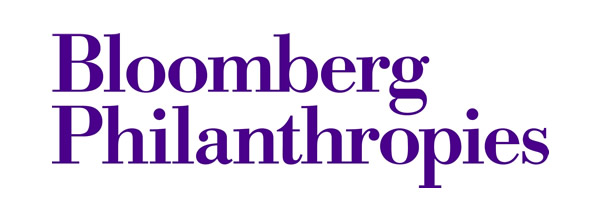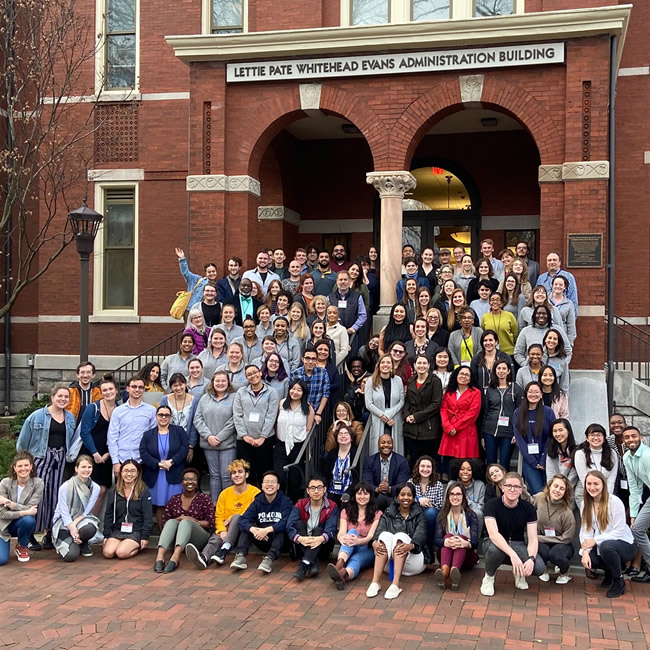« Novavax says its COVID-19 Vaccine Demonstrates 90% Overall Efficacy and 100% Protection Against Moderate and Severe Disease in PREVENT-19 Phase 3 Trial. | Main | Summary of Carbis Bay G7 Summit Communique »
June 15, 2021
Bloomberg Philanthropies 2021 Mayors Challenge Names Top 50 Global Urban Innovations Emerging From Pandemic.
As Mayors Challenge Innovation Competition Proceeds, 50 Finalist Cities Set to Strengthen Ideas with Residents in Coming Months.
Grand Prize Winners to be Chosen Early 2022.


Photo: Bloomberg Philanthropies, the Aspen Institute, and The Atlantic co-host CityLab 2017 in Paris. Image provided by & copyright © Bloomberg Philanthropies. [File Photo]

Photo: Bloomberg Philanthropies, in partnership with the Georgia Institute of Technology and Emory University, hosted over 130 advisors and staff from the CollegePoint Initiative for the program’s 2020 Midyear convening. CollegePoint is a virtual advising initiative that aims to increase the number of high achieving low and moderate-income students who attend top colleges across the USA. Image provided by & copyright © Bloomberg Philanthropies. [File Photo]
NEW YORK, June 15, 2021, — Bloomberg Philanthropies today announced the 50 Champion Cities, representing the boldest urban innovations of the past year, which will advance to the final stage 2021 Global Mayors Challenge. This worldwide innovation competition encourages and spreads the cities’ most promising ideas. This year’s program focuses on elevating the essential public innovations generated in response to the global COVID-19 pandemic.
The 50 cities named hail from 29 nations on six continents. They emerged from a highly competitive applicant pool: Mayors from 631 cities in 99 countries submitted their most promising ideas for consideration which is near twice the number of cities that applied in Bloomberg Philanthropies’ last Mayors Challenge, held in the United States in 2018. The finalists were elevated based on four criteria: vision, the potential for impact, feasibility, and transferability.
The ideas provide a powerful snapshot of the innovation priorities of the world’s cities. At the global level, innovations focusing on improving health and reducing unemployment were most common. Racial justice emerged as the highest priority for U.S. cities, while social inclusion topped the European submissions. In Africa, where the world is experiencing its fastest rates of urbanization, infrastructure was dominant. Nearly half of the recommendations were generated in part through participatory processes with residents.
“These 50 finalists are showing the world that in the face of the pandemic’s enormous challenges, cities are rising to meet them with bold, innovative, and ambitious ideas,” said Michael R. Bloomberg, founder of Bloomberg LP and Bloomberg Philanthropies and 108th mayor of New York City. “By helping these cities test their ideas over the coming months, we will have a chance to identify cutting-edge policies and programs that can allow cities to rebuild in ways that make them stronger and healthier, and more equal and just.”
• The 50 Champion Cities of the 2021 Global Mayors Challenge are:
• Africa (16% of Finalists):
Cape Town, South Africa: Transforming soup kitchens into a sustainable food-distribution infrastructure
Danané, Côte d’Ivoire: Transforming mobility for vulnerable residents
Freetown, Sierra Leone: Incentivizing community action to combat urban deforestation
Kigali, Rwanda: Adopting proven rainwater-harvesting technologies in informal communities
Kumasi, Ghana: Training unemployed youth to create new household toilet technologies
Lusaka, Zambia: Incentivizing the repurposing of trash into needed products
Meru, Kenya: Using Black Soldier Fly larvae to fix an inadequate waste-collection system
Umuaka, Nigeria: Digital support for survivors of gender-based violence
• Asia-Pacific (16% of Finalists):
Auckland, New Zealand: Calculating carbon emissions for infrastructure development
Butuan, Philippines: Leveraging predictive data to bolster local farmers
Daegu, South Korea: Digital permission to bring new life to urban spaces
Manila, Philippines: Building a 21st-century data infrastructure to improve city services
Pune, India: Building the foundation for an all-electric-vehicle future
Rourkela, India: Supporting solar-powered cold storage—plus women entrepreneurship—to reduce food waste
Taipei, Taiwan: Using virtual reality to promote safe, active lifestyles for seniors
Wellington, New Zealand: Leveraging a city digital-twin to encourage resident engagement on climate action
• Europe (16% of Finalists):
Bilbao, Spain: Building a cyber secure city and citizenry
Glasgow, United Kingdom: Unleashing a neighborhood-level participatory approach to community wellbeing
Istanbul, Turkey: Creating a platform for individual philanthropy at a citywide scale
Leuven, Belgium: Using ‘civic contracts’ to drive personal and organizational climate action
London, United Kingdom: Deploying rapid, upstream interventions to prevent chronic homelessness
Paris, France: Offering free climate-activism education for Parisian youth
Rotterdam, The Netherlands: Using digital tokens to incentivize social impact from the private sector
Vilnius, Lithuania: Building a resilient, post-COVID model for hybrid learning
• South America (16% of Finalists):
Bogotá, Colombia: Creating “care blocks” to shift the gender inequity of care
Cartagena, Colombia: Pioneering a gender-aware approach to emergency response
La Paz, Bolivia: Co-designing nine new urban centers with residents to ensure equitable access to services
Recife, Brazil: Deploying a unique mix of services to foster women’s entrepreneurship at scale
Renca, Chile: Enlisting the wisdom of seniors to create community-development projects and reduce isolation.
Rio de Janeiro, Brazil: Improving housing conditions in favelas using cutting-edge mapping technology.
Rosario, Argentina: Formalizing and subsidizing informal waste collection
Tunja, Colombia: Transforming public space with a circular-economy lens
• Middle East (4% of Finalists):
Amman, Jordan: Using “reachability maps” to improve the city’s emergency response and guide investments
Tel Aviv-Yafo, Israel: Engaging youth to make the city’s cultural center more resilient
• North America (32% of Finalists):
Akron, Ohio: Taking lessons from how we train medical students to support Black entrepreneurs
Baltimore, Maryland: Deploying a citywide, coordinated system to support Black-owned businesses
Birmingham, Alabama: Investing in the next generation of food entrepreneurs
Columbus, Ohio: Providing last-mile Wi-Fi access to underserved neighborhoods
Durham, North Carolina: Building a team to help residents access untapped federal resources and support
Guadalajara, Mexico: Creating a “citizen-safety index” to combat violent crime
Hermosillo, Mexico: Providing new employment opportunities for women in the circular economy
Lansing, Michigan: Launching cross-sectoral partnerships to halt learning loss in children
Long Beach, California: Using the city’s power to bring transparency to the gig economy
Louisville, Kentucky: Creating the diverse tech workforce of the future
New Orleans, Louisiana: Bringing a trust-building lens to the delivery of public services
Newark, New Jersey: Reducing crime by focusing on the city’s most persistent offenders
Paterson, New Jersey: Providing a proven, on-demand treatment to those struggling with opioid addiction
Phoenix, Arizona: Deploying “career mobility units” to support job-seekers
Rochester, Minnesota: Creating a pathway for women of color into the growing, high-paying local construction field
San Jose, California: Bolstering the college-support pipeline for marginalized families
The Mayors Challenge selection committee helped Bloomberg Philanthropies select the 50 finalists. The selection committee includes a wide range of global experts:
- Mellody Hobson,, Co-CEO & President, Ariel Investments (Co-Chair)
- David Miliband, President & CEO, International Rescue Committee (Co-Chair)
- Sir David Adjaye, OBE Founder, Adjaye Associates;
- Dr. Yogan Pillay, Country Director for South Africa and Senior Global Director for Universal Health Coverage, Clinton Health Access Initiative;
- Jagan Shah, Senior Infrastructure Adviser, Foreign, Commonwealth & Development Office, British High Commission, New Delhi;
- Linda Gibbs, Principal, Bloomberg Associates; Julia Gillard, 27th Prime Minister of Australia;
- Olafur Eliasson, Artist;
- Gael Garcia Bernal, actor and producer;
- Dr. Jan-Emmanuel De Neve, Professor of Economics and Director, Wellbeing Research Centre, University of Oxford;
- Ms. Phumzile Mlambo-Ngcuka, United Nations Under-Secretary-General and Executive Director of U.N. Women;
- Federica Mogherini, Rector, College of Europe and Former High Representative of the Union for Foreign Affairs and Security Policy;
- Dr. Joshua Sharfstein, Director, Bloomberg American Health Initiative, Johns Hopkins Bloomberg School of Public Health;
- Jennifer Pahlka, Founder and Former Executive Director, Code for America;
- Mariana Costa Checa, Co-Founder And CEO, Laboratoria.
“The level of creativity and innovation among this year’s fifty Champion Cities is a clear sign that cities are continuing to step up amid even the biggest challenges,” said Mellody Hobson. “I look forward to seeing these ideas begin to come to life in the next phase of the competition.”
“With fifty Champion Cities come fifty exciting opportunities to foster innovative ideas,” said David Miliband. “The next Champion Phase will equip city leaders with critical tools to test, learn, and grow these solutions.”
The 50 finalist cities will now enter a four-month testing phase to refine their ideas with technical assistance from Bloomberg Philanthropies and its network of leading innovation experts. Fifteen of the 50 cities will ultimately win the grand prize, with each receiving $1 million and robust multi-year technical assistance to implement and scale their ideas.
“This is always a fascinating phase of the Mayors Challenge, helping mayors push their innovations to even greater heights,” said James Anderson, head of Government Innovation at Bloomberg Philanthropies. “While 15 cities will ultimately take home grand prizes, all 50 cities receive world-class coaching and support to improve their ideas and their potential to improve lives.”
The 2021 Global Mayors Challenge builds on the success of four previous Bloomberg Philanthropies Challenges in the U.S. (2013 and 2018), Europe (2014), and Latin America and the Caribbean (2016). Previous Mayors Challenge grand prizewinners include Los Angeles, USA, Stockholm, Sweden, and Barcelona, Spain.
Bloomberg Philanthropies invests in 810 cities and 170 countries worldwide to ensure better, longer lives for the most significant number of people. The organization focuses on five critical areas for creating lasting change: the Arts, Education, Environment, Government Innovation, and Public Health. Bloomberg Philanthropies encompasses all of Michael R. Bloomberg’s giving, including his foundation, corporate, and personal philanthropy, as well as Bloomberg Associates, a pro bono consultancy that works in cities around the world. In 2020, Bloomberg Philanthropies distributed $1.6 billion.
Source: Bloomberg Philanthropies
|GlobalGiants.Com|







Edited & Posted by the Editor | 3:52 AM | Link to this Post







